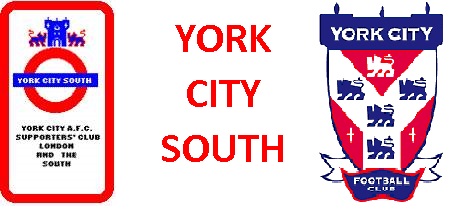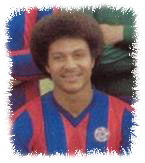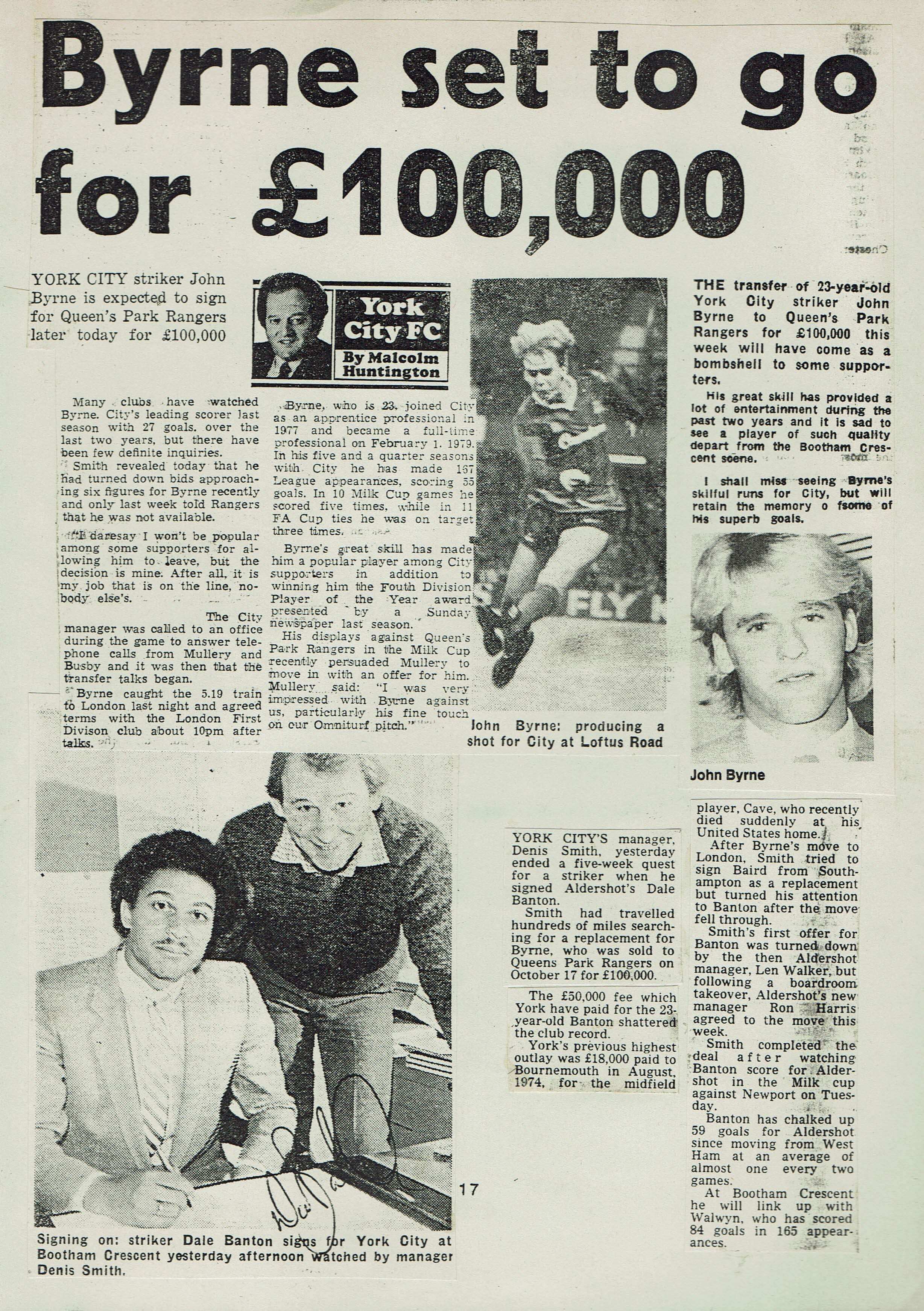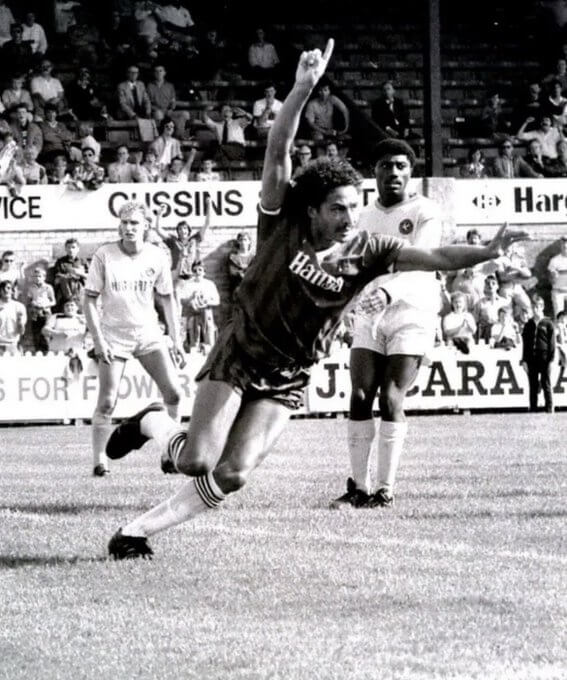

Dale Banton
Dale Banton signed as an associate schoolboy with West Ham where he enjoyed 6 years. Dale moved to Aldershot and with first team football, his goal scoring quickly became prolific.
Highly regarded by Denis Smith and Bobby Saxton, although never quite as prolific at City, he thrived under them both. However, he wasn’t what John Bird was looking for.
An £80,000 move to Walsall, playing a division above City, didn’t work out.
A knee injury robbed him of some of his electric pace (and even today he tends to use a golf buggy when playing golf). A loan move to Grimsby might have proved to be a way out, but Grimsby couldn’t afford him. He later returned to Aldershot where he ended his league career.
His football career ended at Goole when sacked as player manager.
Dale has enjoyed long and successful career as a salesman.
West Ham
As a young boy growing up in Wembley at the time of the 1966 World Cup, he chose to support West Ham as they’d provided 3 of England’s victorious team.
At West Ham, he signed as an associate schoolboy, the clincher being a guided tour of the first team’s team bus. His mum, a teacher, was impressed by Dale being allowed to attend college 2 days a week and the medical facilities at the club. No under the counter money was involved. 2 years as an apprentice and 3 years as a professional followed.
Dale recalled playing in a reserve team match at White Hart Lane against Spurs when both teams fielded star studded sides in front of a 15,000 crowd, with Banton playing in his earlier position as a pacy right winger. Such games counted, playing with proper players in front of big crowds prepared young players for the first team.
West Ham won the FA Cup in 1980. Dale played in the game before the final but was injured and lost his place to Paul Allen.
2 years later, he followed Ray Houghton into the manager’s office and out of the club. John Lyall suggested the easy option was to offer Dale a new contract as he felt Dale had first team potential but felt Dale would benefit from first team football.
Aldershot
At Aldershot, he scored 24 league goals in his first full season. On a £25,000 bonus to score 25 league goals in the season, he was desperate to score in the last game, trying every trick in the book with his teammates and opposition to score a goal. He rued an earlier game when he missed 2 penalties in a game against Wimbledon.
Dale indicated his wages at the time were about £200 a week plus a £50 a game appearance bonus.
A proposed move to George Graham’s Millwall fell down, but in November 1984, City paid £50,000 for his services, very shortly after selling John Byrne to QPR for twice that amount.
York City
Denis Smith and director Colin Webb drove down to Aldershot and agreed a deal with the club. Back in York, Banton negotiated his own contract, he never had an agent throughout his career. I recall press reports at the time stating Denis Smith claimed that he took Dale and his wife on an escorted drive around the city's sights, locked them in the car and wouldn’t let him out until he signed - Ed.
City put him up in lodgings in Clifton Green and paid his commuting expenses until he got fully settled in York.
That first season (1984/5), he was cup tied and therefore missed out on the Arsenal win and the Liverpool games in a stop / start first season. He enjoyed the big match atmosphere with several large crowds for league games (vouchers were distributed for the cup games) meaning he was playing in front of much larger crowds than he had been used to at Aldershot.
Dale enjoyed his time at City, he got on well with both Denis Smith and Bobby Saxton. Despite being not as prolific as at Aldershot, Denis Smith appreciated his assists and work rate as City moved forward. “Keith (Walwyn) is scoring all the goals, you’re getting all the assists, don’t worry about it”.
Dale felt Denis Smith lost control of the players and his regimented approach, treating players more like schoolkids, caused the decline of his City side.
Bobby Saxton came in for glowing praise, “you’re a diamond, and I want to build my team around you”. Dale felt he knew how to man manage his entire squad. He suggested Saxton’s decision to re-build City around a string of his former Blackburn veterans was, with hindsight, the wrong choice. He wasn’t the right man for John Bird who moved him on.
He notes York were a solid team, a family club which he felt was a part of the community citing pub and school and pub visits where the team enjoyed mixing with the local community. Most of the players lived in the York area and there was a strong team spirit. Harry’s Bar held a special place in his heart and he noted how being a footballer give him the virtual freedom of the city (and the delights of the bars).
On moving to City, he settled in York where he has remained to this day. It later involved a daily commute to Walsall (7 days a week when recovering from his knee injury) and when he returned to Aldershot, a weekly commute, staying with his family in Wembley. At other times, he was allowed to train with City. To this day, he remains close his London roots, whilst living in Heslington.
Like everyone else he was at a loss to explain why Keith Walwyn’s goal was disallowed at Anfield but he remembers the team having a “good night” at Buckles Inn on the way home and recalled how he had got off to a good start with a goal on his City debut.
For City, Dale scored 49 goals in 139 appearances and in his first team career, a total of exactly 100 goals in 311 appearances; he didn’t score in his 5 first team appearances at West Ham.
Dale was City’s player of the season in 1987/8, the season in which he was our top scorer. His all time favourite goal is an 18 yard header he scored in City’s 2-1 win over Sunderland in March 1988.
Its probably fair to say that Banton didn't really come into his own until Walwyn left, unfortunately we were a bad side by then and despite his goals, we struggled. On the pitch he was blessed with great skill, a good brain and great vision; combined they put him on a different level to most of his colleagues, his inviting through passes were made to look like bad passes as others didn't read the game as well as Dale. - Ed.
As John Bird looked to re-shape City, Banton secured an £80,000 transfer to Walsall (where he was voted their worst player of all time).
Walsall, Grimsby, Aldershot & Goole
Dale felt Tommy Coakley was the worst manager he played under. Financial troubles at the club meant the players were not paid for around 4 months. Dale felt the PFA should have done much more to help despite portraying themselves as trying to resolve the matter.
Injury didn't help and he hoped a loan move to Grimsby (under Alan Buckley) would work out. Both in halving his daily commute and getting out of Walsall. They couldn’t afford him.
Eventually Dale moved back to Aldershot, for a £25,000 fee, in 1989. He signed for Len Walker who was replaced by Brian Talbot in March 1991. Their relationship got off to a bad start, Talbot not being impressed by Dale having a white Mercedes, a much better car than Talbot was driving, it sounds like Talbot was keen to tell everyone, ”I scored in an FA Cup final” as often as he could and he came across as someone liking control.
Sadly was not the same player on his return to Aldershot. Dale scored just 3 times in 44 games. After a little more than a year, he was released.
His football career ended at Goole. He joined as a player under Terry Curran and was promoted to player manager. His first job was to tell all the players they had to take a pay cut. He was sacked after 5 games (won 3, drew one and lost one) of the 1992/3 season.
Towards the end of his career, Dale’s knees ballooned up after every game, taking 2 to 3 days to recover as he lost all his pace.
After Football
A career in sales beckoned, an area which thrills Dale to this day, likening the feeling of closing a deal to that of scoring a goal. His first job was with Nilfisk, taking Joe Neenan’s old job before moving onto Sherwin WIlliams, a Bolton based firm selling floor resins where he is today. Some of his recent work has involved deals with The Olympic Stadium and The Etihad.
After meeting us, he was off to close a deal with a large confectionery company.
Dale is sad to see where City are today and believes it will be incredibly difficult to get back to where we were in the 1980s.
Although he’s not seen City for about 8 years, he is still in touch with many former players and regularly supports the Vice President’s Golf Day at Pike Hills every summer and hopes to get back to Bootham Crescent before we leave the ground, especially if it is with his good friend Dave McAughtrie to see Dave’s son, Fergus playing for City.
Along the way, Dale Banton revealed


